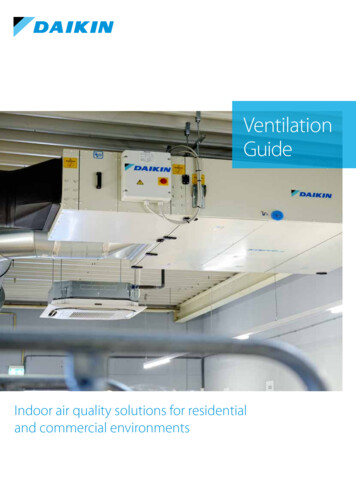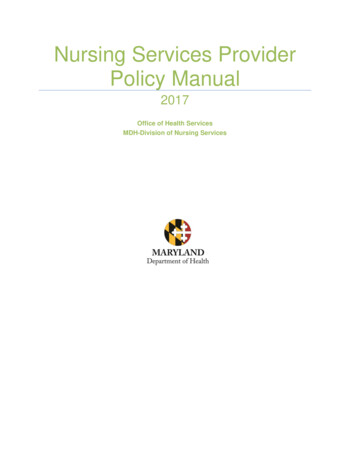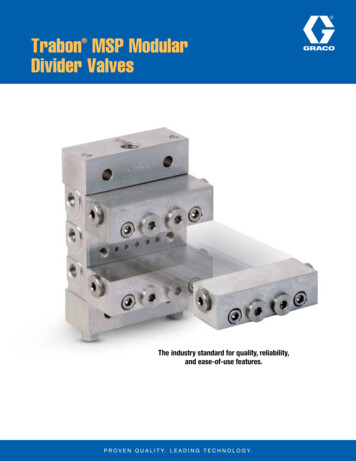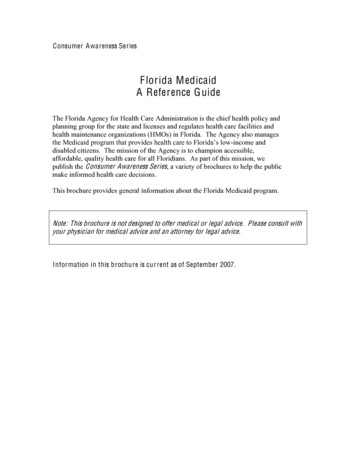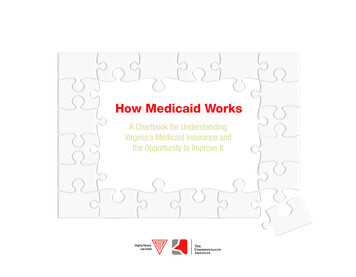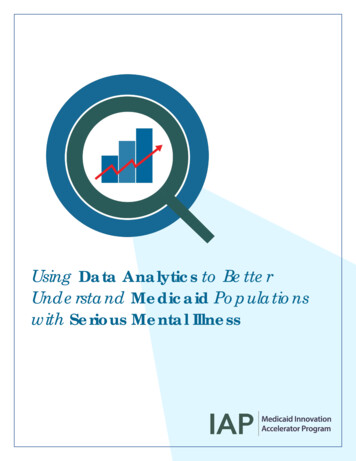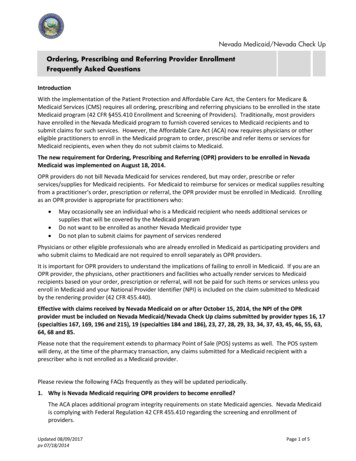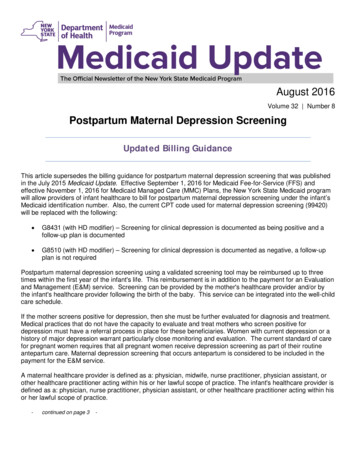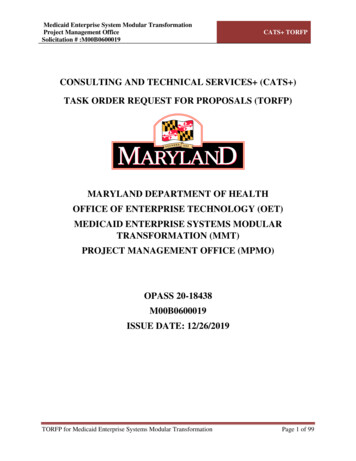
Transcription
Medicaid Enterprise System Modular TransformationProject Management OfficeSolicitation # :M00B0600019CATS TORFPCONSULTING AND TECHNICAL SERVICES (CATS )TASK ORDER REQUEST FOR PROPOSALS (TORFP)MARYLAND DEPARTMENT OF HEALTHOFFICE OF ENTERPRISE TECHNOLOGY (OET)MEDICAID ENTERPRISE SYSTEMS MODULARTRANSFORMATION (MMT)PROJECT MANAGEMENT OFFICE (MPMO)OPASS 20-18438M00B0600019ISSUE DATE: 12/26/2019TORFP for Medicaid Enterprise Systems Modular TransformationPage 1 of 99
Medicaid Enterprise System Modular TransformationProject Management OfficeSolicitation # :M00B0600019CATS TORFPMARYLAND DEPARTMENT OF HEALTH (MDH)KEY INFORMATION SUMMARY SHEETSolicitation Title:Medicaid Enterprise Systems Modular Transformation (MMT)Project Management OfficeSolicitation Number(TORFP#):M00B0600019Functional Area:Functional Area 10 – IT Management Consulting ServicesTORFP Issue Date:12/26/2019TORFP Issuing Office:MDH OETDept of Health Location:201 W Preston Street, Baltimore, MD 21201TO Procurement Officer:Dana Dembrow201 W Preston Street, Room 416 BBaltimore, MD 21201e-mail: mdh.solicitationquestions@maryland.govOffice Phone: 410-767-0974TO Manager:John Molnar201 W Preston Street, Room 415Baltimore, MD 21201e-mail: John.molnar@maryland.govOffice Phone:301-524-9053TO Proposals are to be sentto:TO Pre-proposal Conference:John Gullucci201 W Preston Street, Room 416D-2Baltimore, MD 21201john.gullucci@maryland.govJanuary 9th, 2020 1:00 PM Local TimeSee Attachment A for directions and instructions.TO Proposals Due (Closing)Date and Time:February 10th, 2020 at 2:00 PM Local TimeOfferors are reminded that a completed Feedback Form is requestedif a no-bid decision is made (see Section 5).MBE Subcontracting Goal:28% (Refer to TORFP Section 4.7.1)TORFP for Medicaid Enterprise Systems Modular TransformationPage 2 of 99
Medicaid Enterprise System Modular TransformationProject Management OfficeSolicitation # :M00B0600019CATS TORFPVSBE Subcontracting Goal:2%Task Order Type:Time and Materials with Work Orders of Time and MaterialsTask Order Duration:Five (5) year base period with two (2) one (1) year optionscommencing from the Effective Date.Primary Place ofPerformance:Maryland Department of Health (MDH)201 W Preston Street, Room 416 BBaltimore, MD 21201SBR Designation:NoFederal Funding:YESQuestions Due Date and TimeFebruary 3rd, 2020 2:00 PM Local TimeTORFP for Medicaid Enterprise Systems Modular TransformationPage 3 of 99
Medicaid Enterprise System Modular TransformationProject Management OfficeSolicitation # :M00B0600019CATS TORFPTABLE OF CONTENTS – TORFP1Minimum Qualifications . 71.1234Offeror Minimum Qualifications . 7TO Contractor Requirements: Scope of Work . 82.1Summary Statement . 82.2Background and Purpose . 82.3TO Contractor Responsibilities and Tasks - Category 1 . 132.4Project Support Services - Category 2 . 222.5Deliverables . 232.6Change Orders . 242.7Service Level Agreement (SLA). 25TO Contractor Requirements: General . 263.1Task Order Initiation Requirements . 263.2End of Task Order Transition . 263.3Invoicing . 283.4Liquidated Damages . 303.6Insurance Requirements . 313.7Security Requirements . 323.8RESERVED . 373.9SOC 2 Type 2 Audit Report . 373.10Performance and Personnel . 373.11Substitution of Personnel . 433.12Minority Business Enterprise (MBE) Reports . 443.13Veteran Small Business Enterprise (VSBE) Reports . 45443.14Work Order Process . 453.15Additional Clauses . 46TORFP Instructions 474.1 Task Order Pre-Proposal Conference . 474.2Questions. 474.3TO Proposal Due (Closing) Date and Time . 474.4Award Basis . 484.5Oral Presentation . 484.6Limitation of Liability. 48TORFP for Medicaid Enterprise Systems Modular TransformationPage 4 of 99
Medicaid Enterprise System Modular TransformationProject Management OfficeSolicitation # :M00B06000194.7MBE Participation Goal . 484.8VSBE Goal. 494.9Living Wage Requirements . 504.10Federal Funding Acknowledgement . 504.11Conflict of Interest Affidavit and Disclosure . 504.12Non-Disclosure Agreement. 50514.13HIPAA - Business Associate Agreement . 514.14Mercury and Products That Contain Mercury . 534.15Location of the Performance of Services Disclosure . 534.16Department of Human Services (DHS) Hiring Agreement . 535 TO Proposal Format6CATS TORFP545.1Required Response . 545.2Two Part Submission . 545.3TO Proposal Packaging and Delivery . 545.4Volume I - TO Technical Proposal . 555.5Volume II – TO Financial Proposal . 58Evaluation and Selection Process . 606.1Evaluation Committee. 606.3TO Financial Proposal Evaluation Criteria . 606.4Selection Procedures . 606.5Documents Required upon Notice of Recommendation for Task Order Award . 617 TORFP ATTACHMENTS AND APPENDICES . 6362Attachment A.Pre-Proposal Conference Form. 6665Attachment B.Financial Proposal . 6766Attachment C.Bid/Proposal Affidavit. 6967Attachment D-TORFP – Acknowledgement of Work Order MBE Requirements . 7068Attachment D.Minority Business Enterprise (MBE) Forms . 7169Attachment E – TORFP – Acknowledgement of Work Order VSBE Requirements . 7270Attachment E.Veteran-Owned Small Business Enterprise (VSBE) Forms . 7371Attachment F.Maryland Living Wage Affidavit of Agreement for Service Contracts . 7472Attachment G.Federal Funds Attachments. 7674Attachment H.Conflict of Interest Affidavit and Disclosure . 7775Attachment I.Non-Disclosure Agreement (TO Contractor). 7876TORFP for Medicaid Enterprise Systems Modular TransformationPage 5 of 99
Medicaid Enterprise System Modular TransformationProject Management OfficeSolicitation # :M00B0600019CATS TORFPAttachment J.HIPAA Business Associate Agreement . 8280Attachment K.Mercury Affidavit . 8381Attachment L.Location of the Performance of Services Disclosure . 8482Attachment M.Task Order . 8583Attachment N.DHS Hiring Agreement . 8987Appendix 1.Abbreviations and Definitions . 9088Appendix 2.Offeror Information Sheet . 9392Appendix 3.Criminal Background Check Affidavit . 9493Appendix 4Labor Classification Personnel Resume Summary . 9594Appendix 5Non-Disclosure Agreement (Offeror) . 9897TORFP for Medicaid Enterprise Systems Modular TransformationPage 6 of 99
Medicaid Enterprise System Modular TransformationProject Management OfficeSolicitation # :M00B0600019CATS TORFP1 Minimum Qualifications1.1 Offeror Minimum QualificationsThere are no minimum qualifications for this TORFP.Refer to TORFP Section 3.10.2 ‘Offeror Experience Category 1 and 2’ and TORFP Section 3.10.3 ‘KeyPersonnel Minimum Experience – Category 1 – PMO’ for experience and qualifications necessary to beconsidered reasonably susceptible for award.The personnel proposed under this TORFP must meet all minimum qualifications for the labor categoryproposed, as identified in the CATS RFP, Section /CATSPlus2016/060B24900232016CATSPlus2016RFP.pdf). And subsequent Amendment #4 – Section 2.10 ments/CATSPlus2016/060B24900232016 Section2.10 Amendment.pdfTORFP for Medicaid Enterprise Systems Modular TransformationPage 7 of 99
Medicaid Enterprise System Modular TransformationProject Management OfficeSolicitation # :M00B0600019CATS TORFP2 TO Contractor Requirements: Scope of Work2.1 Summary Statement2.1.1The Maryland Department of Health (MDH or the "Department"), Office of EnterpriseTechnology (OET) is issuing this CATS TORFP to Master Contractors to provide OET withprogram and project management support in the form of a Medicaid Program Management Office(PMO) and module implementation project support services. Services shall be provided forOET’s Medicaid Enterprise Systems Modular Transformation (MMT) project.The MMT project is a multi-phase, multi-year initiative that includes implementing severalfederally required Medicaid Management Information System (MMIS) initiatives along withimprovements to the current MMIS business operations service levels. The objective of thisproject is to develop and execute a plan for replacing Maryland’s legacy MMIS system with anew, modern MMIS based on a modular implementation approach, in compliance with MedicaidInfrastructure Technology Architecture (MITA) 3.0 standards, as required by the Centers forMedicare & Medicaid Services (CMS).2.1.2MDH intends to award this TORFP to up to three (3) CATS Master Contractors that proposesthe most qualified team of resources that can best satisfy the Task Order requirements for theMMT project using CMS MITA standards. Offerors may submit Proposals for Category 1 –Project Management Office (PMO) or Category 2 – Project Support Services or both Category 1and 2. Awards will be made as follows:A. Category 1 – PMO will be awarded to the responsible Offeror with the TO Proposaldetermined to be the most advantageous to the State (refer to TORFP Section 2.3) for alltasks and deliverables designated under Category 1.B.Category 2 – Project Support Services will be awarded to the responsible Offeror(s) with theTO Proposal(s) determined to be the most advantageous to the State (refer to TORFPSection 2.4) for those tasks and deliverables designated under Category 2.C.The Department shall issue separate Work Orders under Category 1 and Category 2. If a TOContractor is awarded both categories, that TO Contractor will not be eligible to compete forany Category 2 Work Order drafted by that TO Contractor.2.1.3Master Contractors are advised that, should a solicitation or other competitive award be initiatedbecause of activity or recommendations arising from this Task Order, the Offeror awarded thisTask Order may not be eligible to compete if such activity constitutes assisting in the drafting ofspecifications, requirement, or design thereof.2.1.4A Task Order award does not ensure a TO Contractor that they will receive all State businessunder the Task Order.2.2 Background and PurposeThe State of Maryland Medicaid Program is a unit of the MDH, which has State responsibility foroperation of the Medicaid Program authorized under Title XIX of the Social Security Act. TheMaryland State Medicaid Program has approximately 1,300,000 enrollees, of which, 1,100,000are enrolled in managed care organizations. MDH has the primary responsibility for themanagement of Medicaid’s Medical Care Programs (MCP) for the State of Maryland.TORFP for Medicaid Enterprise Systems Modular TransformationPage 8 of 99
Medicaid Enterprise System Modular TransformationProject Management OfficeSolicitation # :M00B0600019CATS TORFPManagement of MCP is divided into five administrations: OET, Office of Health Services, Officeof Planning, Office of Finance and the Office of Eligibility Services.The mission of the MCP is to ensure access to medically necessary and appropriate health careservices for Marylanders who cannot afford them. The MCP’s vision is to ensure that allMarylanders have access to quality health care services regardless of their financial status throughdelivery systems that will be models in the health care industry.The current MMIS system was procured in 1992. It is a legacy system used for the claimsprocessing needs of the State of Maryland utilizing batch operations running on a mainframeprocessor. Over the years, the MCP has become increasingly complex, with service changes,eligibility changes, and new regulations. New program requirements are difficult to address withthe existing MMIS system. Labor-intensive “workarounds” are used to address these changes inthe short-term. In addition, like other Medicaid programs, rising costs threaten the MCP’s longterm financial viability, pushing the State to find ways to ensure that the State delivers themaximum value for the cost.CMS released the Medicaid Program Final Rule: Mechanized Claims Processing andInformational Retrieval Systems in December 2015. This final rule modifies regulationspertaining to 42 Code of Federal Regulations (CFR) 433 and 45 CFR 95.611, effective January 1,2016. This final rule supports increased use of the MITA framework.MDH submitted a MMIS Planning Advanced Planning Document (PAPD) to CMS for approvalof MDH’s intentions for improvements to the Maryland Medicaid enterprise. In September 2016,MDH received CMS approval for the funding to complete a MITA 3.0 State Self-Assessment(SS-A) as the initial step towards a modular transformation of Maryland’s MMIS. The MITASS-A will serve as a guide for transforming Maryland’s Medicaid systems and business processesfor replacing the MMIS. MDH developed an Implementation Advance Planning Document(IAPD) for the Maryland MMIS MMT project. The MMT will not be a single monolithic MMISreplacement, rather, the MMIS architecture will disperse legacy MMIS functions and newinitiatives among multiple subsystems comprised of multiple integrated MMIS solutions. TheIAPD for the MMT project includes an implementation time line and request for federal fundingto implement various MMIS modules over an eight-plus year span. This Maryland Program MESModular Transformation Roadmap (MITA Roadmap) includes models where MMT contractorswill be contracted through the MDH procurement processes to perform planning, systemsdevelopment, application development / implementation, interfaces and data efficiencies to thenew MMT. Some of the MMIS modules included in the IAPD are: Customer Relationship Management (CRM) / Case Management Pharmacy Point of Sale Electronic Claims Management System (POSECMS) Decision Support System (DSS) / Data Warehouse (DW) Provider Management Financial Management Core MMISThe estimated timeline for these modules is shown in the MITA Roadmap below:TORFP for Medicaid Enterprise Systems Modular TransformationPage 9 of 99
Medicaid Enterprise System Modular TransformationProject Management OfficeSolicitation # :M00B0600019CATS TORFPMES Modular Transformation (MMT) Roadmap2018ETS1Customer Relationship Management (CRM)ETS2Decision Support System (DSS)/Data Warehouse (DW)PSS1Program Support Office (PMO)PSS2Independent Verification & Validation (IV&V)PSS3System Engineering, Architecture, and Integration (SI)PSS4Staff Augmentation Resources (SAR)Pharmacy Benefit 20292030FGM1 - Point of Sale Electronic Claims ManagementServices (POSECMS)Modular Service (s) - PBM1Operations ManagementFGM2 - Behavioral Health Administrative ServicesOrganization (BHASO)TSE1 - Amazon Web Service (AWS) Migration for EDITPSand eMedicaidModular Service (s) - OM1FGM3 - Provider Management Module (PMM)Provider ManagementModular Service (s) - PM1Member ManagementModular Service (s) - MM1Care ManagementModular Service (s) - CM1Financial ManagementModular Service (s) - FM1EIS1Enterprise Service Bus (ESB)EIS2Consumer PortalEIS3Master Data ManagementKeyEnterprise Technical SolutionsProgram Support ServicesEnterprise Intergrations SolutionsFirst Generation ModulesBusiness AreasTransitional System EnhancementModular ServicesPre-ProcurementDDIBase OperationsProcurementAgile DDIOption YearsIn Planningv05022019NOTE: The timeframes and durations indicated above are estimates only and subject to change.TORFP for Medicaid Enterprise Systems Modular TransformationPage 10 of 99
Medicaid Enterprise System Modular TransformationProject Management OfficeSolicitation # :M00B06000192.2.1CATS TORFPMMT Project GoalsThe stated overarching MMT goals for MDH Goals are: Increase Coordination – Getting a handle on the larger picture, eliminating duplicativeservices and administrative inefficiency results in better care coordination for consumers.Increase Automation – Eliminating time-consuming, manual processes increasesefficiencies and reduces errors in information to support clinical decisions by providersand increases quality for consumers while reducing the length of the process.Enhance Interoperability – Allowing programs/systems to share information, eitherthrough an Enterprise Service Bus (ESB) or direct interfaces, as automation increasesresults in better efficiency and information availability to help program staff completetheir day-to-day tasks.Expand Modularity – Several components of the MMIS are already moving towards amore modular design and continuing this process to expand the modularity of the systemwill allow for the legacy system to be updated in smaller components.2.2.2MITA Overview and SS-AA.MITA OverviewMITA is a business initiative of CMS, in cooperation with state programs, intended to stimulate anintegrated business and technological transformation of the Medicaid Enterprise in all states. The MITAFramework 3.0 is a consolidation of principles, business and technical models, and guidelines that createa template that states may use to develop their individual Enterprise Architectures (EAs). MITAguidelines support states’ requests for appropriate Federal Financial Participation (FFP) for MedicaidEnterprise systems such as the MMIS. MITA is intended to provide a Business and InformationArchitecture that states can use as a framework for improving Medicaid by standardizing processes andexchanging data throughout the Medicaid Enterprise. The MITA processes provide guidance to the statesfor their Medicaid enterprises for how to adopt the MITA Framework through shared leadership,collaboration, and reuse of solutions. The MITA planning guidelines help states prepare the MITA SS-Aand MITA Roadmap to develop enterprise architectures to align to and advance increasingly in MITAmaturity for business, architecture, and data. MITA guidelines support states’ requests for appropriateFFP for their MMIS, as well as the Medicaid IT system(s) projects related to eligibility determination andenrollment activities.MITA identifies common Medicaid business processes and seeks to automate them into web services.Web services encompass standards that enable automated applications to communicate and exchange dataover the internet (or intranet) across many sites and organizations. The development of common data andinformation standards allows interoperability across different platforms, integration of applications, andmodular programming so changes can be introduced incrementally, and existing information assets can beleveraged. MITA entails far more than paying and documenting claims; it envisions significant businessprocessing, information, and technical changes including: Improvements in monitoring programs and the quality of care through data sharing acrossthe Medicaid EnterpriseEfficient use of resources through sharing reusable softwareMore timely responses to program changes and emerging health care needsImproved access to high-quality information so patients and providers can make moreinformed decisions about health careTORFP for Medicaid Enterprise Systems Modular TransformationPage 11 of 99
Medicaid Enterprise System Modular TransformationProject Management OfficeSolicitation # :M00B0600019CATS TORFPThis conceptual transformation entails transitioning to a Service Oriented Architecture (SOA) that isnationally interoperable. Some changes can be made in less than five years. Other transformations willtake five-to-ten years, largely because defining scope changes related to longer-term strategies aredependent upon technologies and business processes that do not exist today or have not yet been fullyevolved by Maryland or CMS.The following CMS website provides information regarding MITA tems/mita/mita-30/index.htmlB.MITA Maturity Model (MMM)The following CMS website explains the MMM role in the MITA architectural framework and how theMITA team, CMS, states, and contractor use harch/downloads/mitamm.pdfC.MDH MITA History1.2.3.4.2.2.32009 – MDH completed a MITA 2.0 SS-A2017 – MDH reviewed the MITA 2.0 SS-A to map to MITA 3.02017 – MDH held series of MITA business sessions to validate MITA AsIs information and define the To-Be vision for progression through theMITA Maturity Levels.2018 – MDH submitted to CMS and updated MITA 3.0 SS-A that included:a. Business Assessment and Technical Assessmentb. Updated MITA As-Is and To-Be Assessmentc. MITA Gap Analysisd. MITA Roadmap that defines the plan for business and functional improvementsto Maryland’s Medicaid Program.Required Project Policies, Guidelines and MethodologiesThe TO Contractor shall be required to comply with all applicable laws, regulations, policies, standardsand guidelines affecting Information Technology projects, which may be created or changed periodically.Offeror is required to review all applicable links provided below and state compliance in its response.It is the responsibility of the TO Contractor to ensure adherence to, and to remain abreast of new orrevised laws, regulations, policies, standards and guidelines affecting project execution. These include,but are not limited to:A. The State of Maryland System Development Life Cycle (SDLC) methodology at:www.DoIT.maryland.gov - keyword: SDLC;B.The State of Maryland Information Technology Security Policy and Standards at:www.DoIT.maryland.gov - keyword: Security Policy;B.The State of Maryland Information Technology Non-Visual Standards tPolicies.aspx;C.The State of Maryland Information Technology Project Oversight at:www.DoIT.maryland.gov - keyword: IT Project Oversight;TORFP for Medicaid Enterprise Systems Modular TransformationPage 12 of 99
Medicaid Enterprise System Modular TransformationProject Management OfficeSolicitation # :M00B0600019CATS TORFPD. IRS requirements for the protection of Federal Tax Information as described in IRSPublication 1075 at: ty requirements as defined in NIST 800-53 Release 4 ations/NIST.SP.800-53r4.pdf; andF.The TO Contractor shall follow project management methodologies consistent with the mostrecent edition of the Project Management Institute’s Project Management Body ofKnowledge Guide; andG. TO Contractor Personnel shall follow a consistent methodology for all Task Order activities.H. The TO Contractor shall ensure that all MMT contractor solutions comply with the nationalstandards as prescribed by HIPAA, by the Balanced Budget Act of 1997, and by any otherFederal requirements.I.The TO Contractor shall ensure that all MMT contractor solutions meet the conditions andstandards for enhanced federal match through the design, development, integration,implementation, and operation of the CMS Conditions and Standards. CMS’ Conditions andStandards are located at https://www.regulations.gov/document?D CMS-2010-0251-0044J.The TO Contractor is responsible for ensuring that all MMT contractor solutions arecompliant with CMS Conditions and Standards. The State is committed to compliance withCMS’s Conditions and Standards for Enhanced Federal Funding, including requirementsestablished in State Medicaid Director Letter (SMDL) # 16-009, released June 27, nce/downloads/smd16009.pdf.2.3 TO Contractor Responsibilities and Tasks - Category 1The following are examples of the tasks and deliverables that will be required in Work Ordersissued under Category 1 – Program Management Work Orders that will be issued by MDH:2.3.1Programmatic Advisory and Support ServicesThe TO Contractor shall provide programmatic advisory services to MDH for planning andmanaging the MMT program. The TO Con
Baltimore, MD 21201 e-mail: Office Phone: mdh.solicitationquestions@maryland.gov 410-767-0974 TO Manager: John Molnar 201 W Preston Street, Room 415 Baltimore, MD 21201 e-mail: Office Phone: John.molnar@maryland.gov 301-524-9053 TO Proposals are to be sent to: John Gullucci 201 W Preston Street, Room 416D-2 Baltimore, MD 21201


